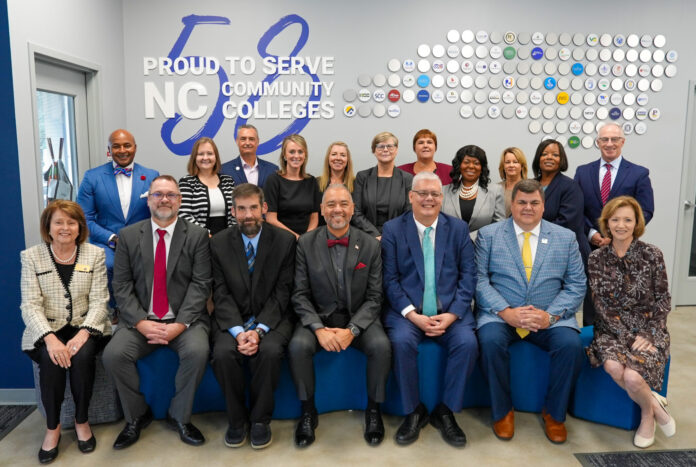As the new year begins, I have a renewed sense of hope and possibility for the future. For myself – and for many – it’s a time for reflection and for embracing the new opportunities that lie ahead. In North Carolina, that sense of renewal is personified in the rising leaders who are preparing to shape the future of community colleges across our state. The Aspiring Presidents Institute, a new program focused on developing the next generation of educational leaders, offers a powerful reminder that our collective future is bright when we invest in the talent and dedication of those committed to serving their communities and transforming students’ lives.
Developed in collaboration with the Belk Center for Community College Leadership and Research and the North Carolina Association of Community College Presidents, the program is designed to identify and develop a diverse cadre of qualified professionals for community college presidency in North Carolina. And after meeting with the 17 members of the program’s first cohort in the fall and hearing more about their expertise and commitment for community college education, it seems that the future of North Carolina is very bright indeed.
We have an abundance of immensely qualified, courageous, compassionate leaders among us who recognize that community college presidency is a commitment to service – and not only to the students, faculty and staff that belong to them, but to entire communities. They recognize that community colleges serve as hubs of their communities – and they are ready and eager to step up to the plate and give themselves to the work of transforming lives and strengthening regions across our great state.
Developing qualified leaders
Nominated by the presidents of the community colleges where they currently serve, these aspiring presidents are all senior leaders with diverse qualifications, extensive experience and remarkable accolades.
The Aspiring Presidents Institute builds on their qualifications by exposing these aspiring leaders to the stakeholders and responsibilities of presidential leadership in the North Carolina Community College System (NCCCS). Through programming and curriculum designed by the Belk Center team and members of a professional development committee, aspiring presidents further developed their critical skills in interviewing, fundraising, storytelling, data-informed decision-making, governance and more.
They are also given the unique opportunity to develop important relationships with other cohort members, sitting presidents and other leaders within the system. Furthermore, they gain firsthand knowledge of the presidential role through mentorship with a presidential executive.
Serving local communities
Already, there are so many things to celebrate and admire about this inaugural cohort. From increasing enrollment and creating strategic plans to developing community partnerships and supporting QEP initiatives, these diverse leaders have made significant contributions to colleges in our state’s rural and urban communities.
Perhaps most important of all, these aspiring presidents are no strangers to our state. Whether homegrown as products of the North Carolina Community College System or longtime servants of our state’s community colleges, these leaders have given their lives and careers to addressing complex issues across the state’s educational landscape.
In other words, it is not only their expertise and training that gives me hope for our state – but their fervor and zeal to drive student success, workforce preparation and economic mobility to strengthen the very communities they call home.
The Aspiring Presidents Institute plays an important role in keeping these high-capacity leaders in our state by providing them with resources to maximize their potential and prepare them for presidential leadership.
Transforming lives
For Aspiring Presidents Institute cohort member Dr. Constance Wolfe, executive vice president of Alamance Community College, the institute is a unique opportunity to prepare for presidential leadership and build on her internal operations knowledge by gaining valuable exposure to fundraising and decision-making with external stakeholders. This leadership opportunity, she believes, will equip her for presidency – and she is eager to leverage these skills to continue serving the state of North Carolina.
“As a long-serving public educator who began as a writing and literature instructor, I believe in the power of open-access education to change lives and improve communities. In particular, I am excited about the opportunity to serve a North Carolina community in a greater role,” Wolfe says.
“I am eager to apply all that I have learned about student success and organizational effectiveness to expand and improve student learning in order to transform lives and contribute to a thriving, diverse community,” she continues. “When someone does work that they love doing, when they flourish in their profession, amazing and miraculous things can happen. That’s what I want to bring to a presidency, and that’s how I want to inspire those who work with me.”
Dr. Kara Battle, vice president and chief academic officer of Durham Technical Community College, agrees. Her knowledge of the profound impact community colleges play in their communities, she says, is what most inspires her to pursue a presidency in the North Carolina Community College System.
“I am impassioned by education’s transformative potential. Reflecting on [my] diverse roles as an instructor, advisor and dean, I feel called to lead [and aim] to replicate the transformative impact that ignited my career. This aligns with my commitment to accessible education [and] addressing socioeconomic gaps.”
– Dr. Kara Battle
For Dr. Chad Merrill, executive vice president of operations at Blue Ridge Community College, more than 25 years of experience in the North Carolina Community College System, paired with his deep passion for the mission of community colleges, is what has inspired him to be a part of the Aspiring Presidents Institute.
“From my very first experience with community college students, I knew this was my calling – that’s why I pursued advanced degrees in community college administration and leadership. I am committed to expanding student access and success, and creating workforce development opportunities that will strengthen our service area and the communities we serve.”
– Dr. Chad Merrill
Brightening the future
Looking at all of the remarkable leaders in our inaugural cohort gives me great confidence for the state of North Carolina. They understand that while community college education is deeply transformational, that transformation is challenging work that takes time.
However, like so many people in our great state right now, they are ready to roll up their sleeves and get to work.
And with the continued leadership development and mentorship they will receive in the Aspiring Presidents Institute, plus the camaraderie and support of others on the same journey, I know they will be equipped to tackle whatever challenges come their way.
Acknowledgement: A special note of thanks goes to Dr. Monica Clark, Deputy Director, and the Belk Center team for their leadership and coordination of this program, and to our NCACCP Professional Development Committee members who provided strategic guidance throughout the planning process.




